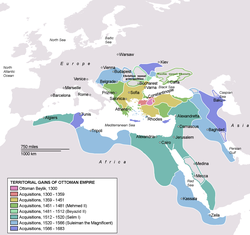Ottoman Empire
The Ottoman Empire (/ˈɒtəmən/; Ottoman Turkish: دَوْلَتِ عَلِيّهٔ عُثمَانِیّهDevlet-i Aliyye-i Osmâniyye, Modern Turkish: Osmanlı İmparatorluğu orOsmanlı Devleti), also known as the Turkish Empire, Ottoman Turkey[10][11] or Turkey, was an empire founded in 1299 by Oghuz Turksunder Osman I in northwestern Anatolia.[12] After conquests in the Balkansby Murad I between 1362 and 1389, the Ottoman sultanate was transformed into a transcontinental empire and claimant to the caliphate. The Ottomans ended the Byzantine Empire with the 1453 conquest of Constantinople by Mehmed the Conqueror.[13][14][15]
During the 16th and 17th centuries, in particular at the height of its power under the reign of Suleiman the Magnificent, the Ottoman Empire was a multinational, multilingual empire controlling much of Southeast Europe,Western Asia, the Caucasus, North Africa, and the Horn of Africa.[16] At the beginning of the 17th century the empire contained 32 provinces and numerous vassal states. Some of these were later absorbed into the Ottoman Empire, while others were granted various types of autonomy during the course of centuries.[dn 4]
With Constantinople as its capital and control of lands around theMediterranean basin, the Ottoman Empire was at the centre of interactions between the Eastern and Western worlds for six centuries. Following a long period of military setbacks against European powers, the Ottoman Empire gradually declined into the late nineteenth century. The empire allied withGermany in the early 20th century, with the imperial ambition of recovering its lost territories, joining in World War I to achieve this ambition on the side of Germany and the Central Powers. While the Empire was able to largely hold its own during the conflict, it was struggling with internal dissent, especially with the Arab Revolt in its Arabian holdings. Starting before the war, but growing increasingly common and violent during it, major atrocities were committed by the Ottoman government against the Armenians,Assyrians and Pontic Greeks.[17] The Empire's defeat and the occupation of part of its territory by the Allied Powers in the aftermath of the conflictresulted in the emergence of a new state, Turkey, in the Ottoman Anatolian heartland following the Independence war, as well as the founding of modern Balkan and Middle Eastern states.[18]
'연구하는 인생 > Histrory' 카테고리의 다른 글
| Acient Greece (0) | 2015.12.13 |
|---|---|
| 고대 그리스 (0) | 2015.12.13 |
| History of Korea (0) | 2015.12.13 |
| 일본 역사 History of Japan (0) | 2015.12.13 |
| History of China (0) | 2015.12.12 |




